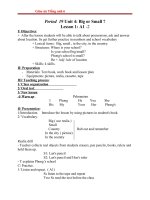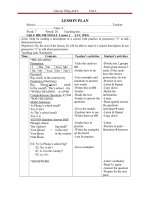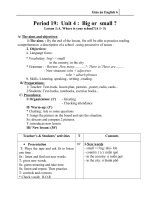Giáo án tiếng anh 10: Unit 4: Special Education ppt
Bạn đang xem bản rút gọn của tài liệu. Xem và tải ngay bản đầy đủ của tài liệu tại đây (144.4 KB, 49 trang )
G
G
i
i
á
á
o
o
á
á
n
n
t
t
i
i
ế
ế
n
n
g
g
v
v
ă
ă
n
n
1
1
0
0
Unit 4: Special Education
The 20
th
period
Date:
Grade 10
Theme: Special Education
Unit 4
Reading
Time: 45 minutes
I. Objectives:
1. Educational aim: Students will be able to
understand the term Special
Education and talk about it through
Matching and Multiple Choice
exercise
2. Knowledge:
- General knowledge: Students know the information
about Louis Braille and the special
classes for disabled people
- Language: words related to disabled people
3. Skill: reading about special education
II. Method: Integrated, mainly communicative
III. Teaching aids: textbook, board, raising questions
IV. Procedures:
Teacher’s activities Students’
activities
Notes
Warm-up: (3 minutes)
- Greeting
- Who’s absent today?-
Thanks
- Greeting
- The monitor
answers
- Where did you stop last
time?
- Open your book and we
will go to Unit 4: Special
Education
Pre-reading: (10 minutes)
- Raising some questions:
* What do you do
everyday?
* Do you go to class? listen
to music? watch T.V?
- Take notes students’
answers on the blackboard
* Which of these activities
would be difficult for
disabled people?
- Answer in
chorus
- Open the books
and listen to the
teacher
- Answer freely
- Listen to the
Ok, people who cannot be
able to listen and watch are
called deaf and blind
people.
* Who can say nothing?-
Good
* How can they
communicative with each
other?
* How can blind people
read?
Well, there was a person- a
man invented the letter
systems for blind people to
help them read easily. He
was Louise Braille. He
came from France. He was
a blinded in a childhood
teacher
- dumb people
- use signals
- We don’t know
(maybe students
answer by
Vietnamese)
- Listen to the
teacher
- Look at the
books
accident.
- Look at Braille Alphabet
(on the page 44) and work
with your partner about the
message
- Give answers:
A. we
B. are
C. the
D. world
While-reading: (20
minutes)
- Open your books
Task 1
- Ask students to read
- Work in pairs
- After guessing,
correct the
answer under the
teacher’s
construction
- Read
individually
through the passage
individually and do Task 1
- Raising some questions
about the passage:
* Who’s in the passage?
* What does the passage
talk about?
* How many children are
there in her class?
* Who are they?
* Do they go to school?
* Why do you know?
- Explain new words:
proper schooling (n) =
enough and good study
* What do the parents of the
disabled children think?
- Miss Thuy
- special class
- 25
- disable people
- No, they don’t
- in 4
th
sentence
- They believe
that the children
could not learn
anything at all (
Which line helps you
know? Which word?
opposition (n) = disagreeing
viewpoints
* How does Miss Thuy
Teacher’s activities the
disable children in a math
lesson?
* How are the children?
- Ask students to do
matching in chorus
- Confirm the correct
answers
2
nd
sentence-2
nd
paragraph)
- She raised both
arms and opened
up her fingers…
(2
nd
sentence- 3
rd
paragraph)
- They are proud
of their efforts
Key:
1.C-2.E-3.A-
4.B-5.D
- Listen to their
friends
Task 2
- Call on some students to
read aloud each part of the
passage
- Check pronunciation
- Ask students to read the
passage again more
carefully and do the task 2
- Ask some students to give
their answers
- Correct the answer
1.D - 2.B - 3.A - 4.C - 5.D
Post-reading: (10 minutes)
- Ask students to read the
passage in pairs and fill the
blank of summary using
- Read the
passage and do
the task
- Listen to the
teacher
- Read in pairs
and do the task
suitable words from the
passage
- Go around and provide
help
- Call on some students to
give answers
- Confirm the correct
answers for students to
check and write down
- Call on some students to
read the completed
summary aloud in front of
the class
- Listen to the
teacher
attentively and
check the
answers
- Listen to their
friends
Key:
1.disable-2.read-
3.write -
4.efforts-
5.opposition-
6.time-
consuming-
7.maths-8.arms-
9.figers –
10.proud
Homework: (2 minutes)
- Summarize the passage
into 5 sentences
- Do the exercises in the
workbook
- Write down on
the notebooks
The 21
ts
period
Date:
Grade 10
Theme: Special Education
Unit 4
Speaking
Time: 45 minutes
I. Objectives:
1. Educational aim: By the end of the lesson,
students will be able to:
- talk about school life of a student
- actively engage in an interview
2. Knowledge:
- General knowledge: Students know how to talk
about school; make an interview and
reporting on results
- Language: words related to school life
3. Skill: speaking about school life of students
fluently
II. Method: Integrated, mainly communicative
III. Teaching aids: textbook, board, raising questions,
hand-outs
IV. Procedures:
Teacher’s activities
Students’
activities
Notes
Warm-up: (2 minutes)
- How are you today?
- Are you ready for new
lesson?
Pre-speaking: (15
minutes)
- Give hand-outs to
review the names of
subjects at school
-Ask students to work in
pairs
- Give answers:
1.C-2.D-3.G-4.F-5.B-
- Answer freely
- Do the exercise
in hand-out
- Work in pairs
- Correct the
answers
- Answer freely
6.I-7.E-8.A-9.H
- Ask some questions:
* What are your favorite
subjects?
* How much time do
you prepare for your
lesson everyday?
OK, today, we will go to
Lesson: Speaking to talk
about school life of a
student
While-speaking: (25
minutes)
Task 1
- Ask students to read
the answer before
- Listen to the
teacher
- Read the answers
and do the task 1
- Work in pairs
- Listen to their
friends
choosing the best
questions
- Ask students to work
in pairs to fill in the
blanks with the right
questions
- Call on some students
to explain their answers
- Give correct answers
A.4-B.1-C.2-D.6-E.3-
F.5-G.7
- Call some pairs to read
the completed
conversation
- Check pronunciation
Task 2
- Listen to the
teacher attentively
then correct the
answers
- Listen to the
teacher
- Work in pairs
- Ask students to use
his/her own information
to answer the questions
- Instruct students to do
this task by using
following information
Hand-outs
- Ask students to work
in pairs with 3 students
(2 practice interviewing,
1 take notes) and carry
out the interview, using
the questions in Task 1
- Help students use some
questions related to
words, such as:
What subjects were you
and do the task 2
under the
construction of the
teacher
- Practice speaking
in pairs
good/ bad at?
How much homework
did you have to do?
- Check whether
students can make
questions or not by
giving the previous
words and let students to
make questions using
those words
- Go arround and
provide help if necessary
Task 3
- Ask students in each
pair to tell about a
school life of a student
- Some students to
tell a school life of
others in front of
the class
by using information
that was taken note in
front of the class
- Check pronunciation if
necessary
- Give comments and
correct mistakes
- Give marks
Post-speaking: (2
minutes)
- Summarise the main
points
Homework: (1
minutes)
- Listen to the
teacher and write
down on the
notebook
- Ask students to write a
short paragraph about
his/her studying at
school (80-100 words)
The 22
nd
period
Date:
Grade 10
Theme: Special Education
Unit 4
Listening
Time: 45 minutes
I. Objectives:
1. Educational aim: Students will be able to listen
better through True of False
Statements and Gap-filling exercises
2. Knowledge:
- General knowledge: Students can listen and
understand about the Vang Trang
Khuyet Photographic Club
- Language: Words related to Photographic Club
3. Skill: Listening for specific information about a
photographic club for disabled children
II. Method: Integrated, mainly communicative
III. Teaching aids: textbook, board, raising questions
IV. Procedures:
Teacher’s activities
Students’
activities
Notes
Warm-up: (2 minutes)
- Greeting
- How do you feel
today?
- Do you like taking
photos?
Yes, today we will listen
to the Vang Trang
Khuyet Club in which
all the members are all
disabled children
Pre-listening: (10
minutes)
- Before listening, I have
some questions for you
- Give some photos and
- Answer freely
- Yes, we do
- Listen to the
teacher
- They are photos
ask:
* What are they?
* How do you call a
person who takes
photos?
* Well-done! What word
do you use for a person
who looks good/
attractive in photos?
- Confirm the meanings
of the previous words
and remind students the
stress in the words
photograph /ƒ
photographic
photogenic
photographer
- A photographer
- Photogenic
- Listen to the
teacher and write
down on the
notebooks
- Work in pairs
photography
- Ask students to work
in pairs to fill each blank
with a suitable word
- Check the answers and
correct
1. photographic
2. photography
3. photographer
4. photograph
5. photogenic
+ Listen and repeat
- Read new words 1
st
time
- Read aloud 2
nd
time
- Let students guess the
- Answer in chorus
- Listen to the
teacher
- Guess the
meanings of the
words
- Take note
quickly
meanings of the words
by giving explanation
sorrow (n) = pain (n)
passion (n) = great love
for sth
mute (adj) = unable to
speak
exhibition (n) = a
display
laborer (n) = worker
While-listening: (20
minutes)
- You are going to listen
to a talk about a club for
disabled children. You
should listen carefully,
- Read the
statements
independently
- Listen to the tape
attentively and do
the task 1
then do task 1 and 2
Task 1
- Let students read the
statements carefully
- Ask students to listen
to the tape and decide
whether the statements
are T/F
- Listen 2 times and ask
students to compare
their answers with a
friend
- Check the answers as
the whole class
- Give correct answers
Task 2
- Ask students to read
- Work in pairs
- Listen to the
teacher attentively
then correct the
answers
- Read the passge
individually
- Listen to the tape
again
- Do the task 2
the passage carefully
and have a guess of
missing words (give
necessary suggestions to
help students guess
kinds of words in each
blank)
- Have students listen to
the tape and write in
each blank with a
suitable word
- Check the answers as
the whole class
- Call on 2 students to
write the answers on the
board to check dictation
- Give correct answers:
- Look at the board
and find out
mistakes









